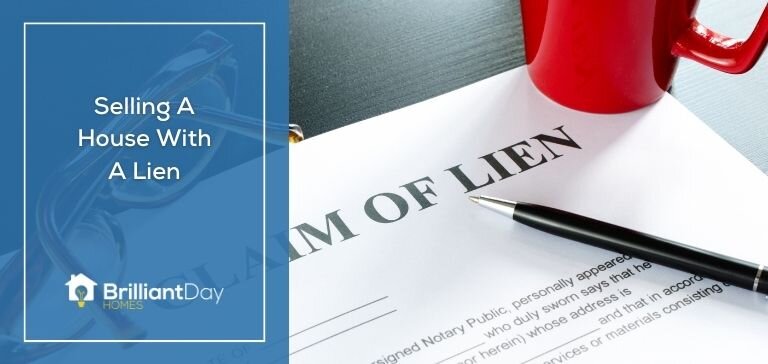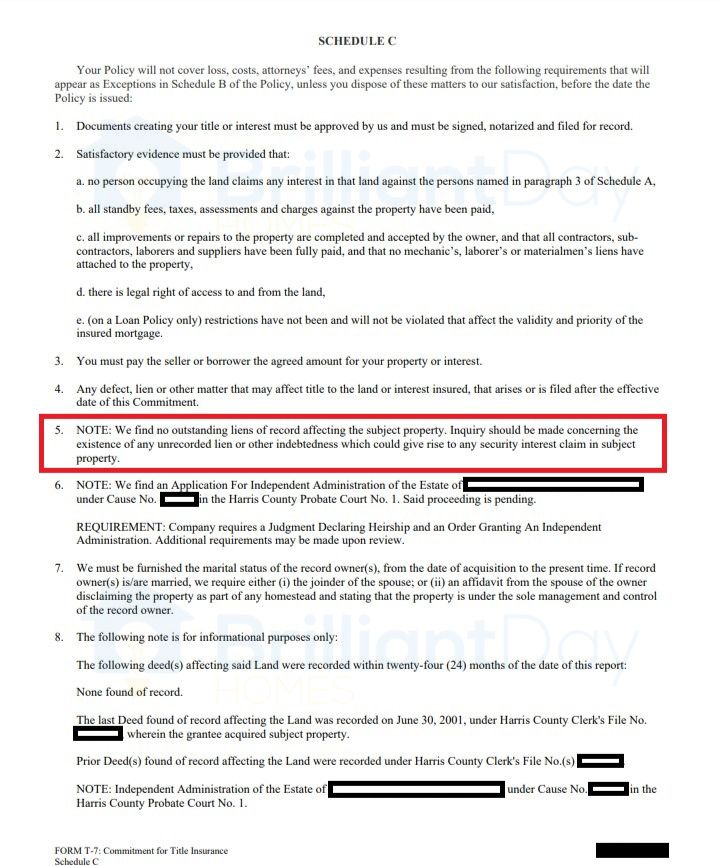
You must either remove the lien or pay it off to be able to sell the house. Having a lien on a property will create a cloud on title that will prevent you from selling your house without getting the lienholder’s approval and release. If you are selling your house, a title search will be run as part of the process – in Texas, this is done by a title company. If a lien shows up on your title, you will need to determine if the lien is legitimate. If it is legitimate, you will need to pay it off, which is usually done using the proceeds from the sale of your house. If it is not legitimate, you will likely need to do some additional work to prove it and have it removed.
What Is A Lien?
A lien is a legal claim against a piece of property that is recorded with the local county, giving the lienholder a legal interest in a property. A lien creates a could on title and will appear in public records for a property. In more simplistic terms – A lien is a notice that attaches to your property, telling the world that a creditor claims you owe them some money. There are two different types of liens that can be attached to a house – involuntary liens and voluntary liens.
What Are Voluntary Liens On A House?
A voluntary lien is a lien where the owner of a property consensually grants another party a legal claim to the property as security for the repayment of a debt. Some examples of these would be a mortgage, a home equity loan, and a solar lien.
1. Mortgage Lien:
When you purchase a house using money from the bank, the bank will record a lien on your property. This serves as collateral for your mortgage and ensures the lender gets paid if you decide to sell the house. In addition, if you fail to make payments on your mortgage it gives the bank the right to the property if it is foreclosed on.
2. Home Equity Loan Lien:
A home equity loan is when you borrow money against the equity you have in your house. In the same way that your mortgage protects the bank, the loan is also secured to the house using a lien.
3. Solar Lien:
If solar panels are purchased for a house, the solar panel company will likely place a lien on the house if the panels were financed. Once again this is done to protect the solar panel company from a financial loss should you sell the house.
What Are Involuntary Liens On A House?
Involuntary liens are liens that are placed on a property by an outside authority against the will of the owner. Rather than mortgage lenders placing a lien on the property, involuntary liens are typically placed on properties by regulatory authorities for unpaid debt obligations. Some examples of these are mechanics liens, child support liens, tax liens, and judgment liens.
1. Mechanics Lien:
A mechanics lien is filed by someone who has done work on a house, but claims they have not been paid. This can be a roofer, a plumber, or any other person or business that claims they have done work to improve your property (done work on your house) and were not paid.
2. Judgment Lien:
A judgment lien can be the result of things like unpaid medical debt or credit card debt.
3. Child Support Lien:
A lien can be placed on a house if the owner fails to make child support payments or alimony.
4. Tax Lien:
A tax lien on a house can be the result of the homeowner failing to pay their income tax, property tax, or other taxes.
5. HOA Lien
Texas state law gives your homeowners’ association or condo associations the right to put a lien on your property if you fail to pay assessments, fees, or fines. An HOA lien is a judgment lien that results from a court-ordered money judgment. In essence, an HOA will go to court over a homeowner member’s delinquent dues and attempt to convince the court to issue a judgment.
6. Utility Lien
A utility lien is placed on a house when payments are not made for a certain utility, like water for example. There are some restrictions on utility liens in Texas. You cannot place a utility lien on a homestead. In addition, you cannot place a utility lien on a house where it is in a tenant’s name.
How Can You Tell If A House Has A Lien On It?
It is actually easy to find out if a property has a lien on it. Since property liens are public information you can search the property records on the county clerk’s website, or if the information is not online, you can contact the county clerk or recorder of deeds.
Another option is to use a title company. If you haven’t started the process of selling your house, you can pay a title company to run a title search to find out if there are any issues or defects. This will usually cost $150 – $250 depending on the title company. If you are already selling your house the title company discovers the lien they will place it in the “Schedule C” portion of the Title Commitment.

Can I Sell A House With A Lien?
In order to clear the title to a property, all liens must be removed. Since the purpose of the lien is to protect the lienholder, the lien will stop a title company from issuing title insurance, which would stop a potential buyer from moving forward.
How Do You Remove A Lien On A House?
If you have had an involuntary lien placed on your property you first need to determine if the lien is legitimate. See if you recognize the name of the plaintiff (person or company who has filed the lien). If you don’t recognize the lien, you can call whoever is listed as the plaintiff and find out more information. If you find out the lien is legitimate, then you can remove it by paying it off. In some cases, you can negotiate to reduce the lien.
If the lien is not legitimate, you will likely need to seek legal action.
Final Thoughts
Liens can be an unpleasant surprise to deal with and can cost a lot of money. If you want to sell your house and you don’t want to deal with liens or don’t have the money to do so, we can help just give us a call at 713-903-2582.
Need To Sell Your House, But Don’t Want The Hassle Of Liens? – We Buy Houses In Any Situation.
Get Your Fair Offer TODAY!
We buy houses in any condition. No realtors, no fees, no repairs, no cleaning.
Find Out How Much We Offer For Your House In Cash!
